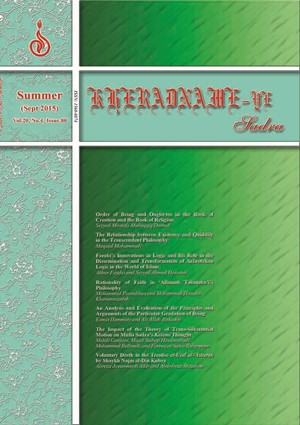Rationality of Faith in ‘Allamah Tabataba’i’s Philosophy
Subject Areas : پژوهش درباره فیلسوفان صدرایی و شارحان و منتقدان ملاصدراMohammad Poorabbas 1 * , Mohammad Hossein Khavaninzadeh 2
1 - Allameh Tabataba’I University
2 - Allameh Tabataba’I University
Keywords: Rationality faith religious beliefs ‘Allamah Tabataba’i ,
Abstract :
Faith and the quality of its relationship with the problem of rationality has always been one of the central problems attracting the attention of philosophers and researchers working in the field of the philosophy of religion. This has resulted in the development of some of the most important schools of philosophy and theology in the West and in the Islamic world. In this study, the researchers have tried to explain the place and role of the intellect in the system of religious beliefs based on the ideas of ‘Allamah Tabataba’i through a correct analysis and perception of the truth of faith and description of its major components and elements. ‘Allamah Tabataba’i believed that knowledge plays a fundamental role in the realm of faith and considered it to be the prerequisite for faith. Therefore, in order to explain the relationship between the intellect and faith, he argued that the intellect precedes faith. Moreover, owing to faith’s epistemological nature, he considered it to be one of the important achievements of the intellect. At the same time, by avoiding any extreme measure in this regard, he granted a supreme station to the intellect in the domain of faith and religious believes. He even introduced the truth of definite rational judgments as the basis for the truth of the religion. On the other hand, given the influence of faith over the human intellect and free will, ‘Allamah maintained that the believers can develop a deeper and more extensive perception of religious truths in the light of a faith-oriented life. Of course, he was never heedless of the perceptive limitations of the intellect in certain epistemological fields of religion and referred to them in some of his works, particularly in al-Mizan.
قرآن كريم.#
آهنگر، جواد و ديگران، مرزبان وحي و خرد، قم، بوستان كتاب، 1381.#
ابن فارس، احمد، معجم مقاييس اللغه، قم، 1404ق.#
ابن منظور، محمد بن مكرم، لسان العرب، بيروت، دارصادر، 1414ق.#
پترسون، مايكل و همكاران، عقل و اعتقادات ديني، ترجمة احمد نراقي و ابراهيم سلطاني، تهران، طرح نو، 1383.#
پلنتينجا، الوين و ديگران، كلام فلسفي، ترجمة ابراهيم سلطاني و احمد نراقي، تهران، مؤسسه فرهنگي صراط، 1384.#
جوادي آملي، عبدالله، منزلت عقل در هندسه معرفت ديني، قم، نشر اسراء، 1386.#
جوادي آملي، عبدالله، تسنيم، ج2، قم، نشر اسراء، 1389.#
جوهري، اسماعيلبن حماد، الصحاح؛ تاج اللغة و صحاح العربية، بيروت، دار العلم للملايين، 1376ق.#
راغب اصفهاني، حسين بن محمد، مفردات ألفاظ القرآن، بيروت، دارالقلم، 1412ق.#
ژيلسون، اتين، عقل و وحي در قرون وسطي، ترجمة شهرام پازوكي، تهران، انتشارات گرّوس، 1378.#
سروش، محمد، آزادي، عقل و ايمان، قم، دبيرخانة مجلس خبرگان رهبري، 1381.#
شبّر، سيدعبدالله، حق اليقين في معرفة اصول الدين، قم، انوار الهدي، 1424ق.#
طباطبايي، محمدحسين، بررسيهاي اسلامي، قم، بوستان كتاب، 1387.#
طباطبايي، محمدحسين، رسائل توحيدي، قم، بوستان كتاب، 1388.#
طباطبايي، محمدحسين، شيعه در اسلام، قم، بوستان كتاب، 1387.#
طباطبايي، محمدحسين، الميزان في تفسير القرآن، قم، انتشارات اسلامي، 1417ق.#
طبرسي، فضل بن حسن، مجمع البيان في تفسير القرآن، تهران، ناصر خسرو، 1372ق.#
طبرسي، فضل بن حسن، تفسير جوامع الجامع، تهران، دانشگاه تهران، 1377.#
غروي اصفهاني، محمدحسين، نهاية الدرايه، قم، انتشارات سيدالشهداء، 1374.#
فاضل مقداد، ارشاد الطالبين الي نهج المسترشدين، قم، كتابخانة آية الله مرعشي، 1405ق.#
مرتضي زبيدي، محمد بن محمد، تاج العروس من جواهر القاموس، بيروت، دار الفكر، 1414ق.#
مصباح يزدي، محمدتقي، اخلاق در قرآن، قم، مؤسسه آموزشي و پژوهشي امام خميني، 1391.#

